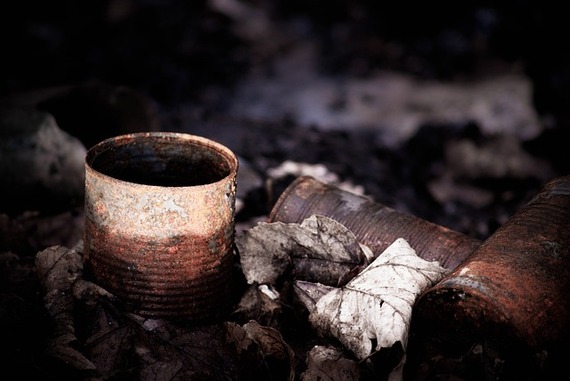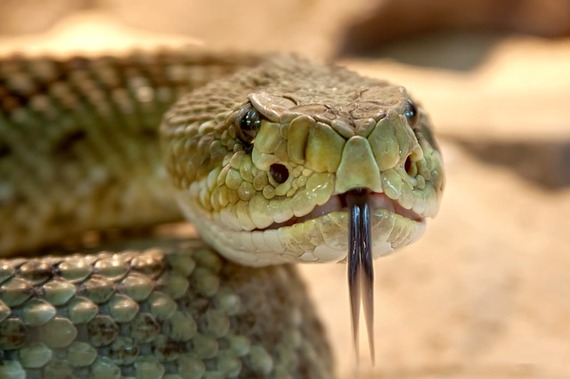"I do not worship matter. I worship the Creator of matter who became matter for my sake, who willed to take His abode in matter, who worked out my salvation through matter. Never will I cease honoring the matter which wrought my salvation! I honor it, but not as God.... Because of this I salute all remaining matter with reverence, because God has filled it with his grace and power. Through it my salvation has come to me."
- St. John Damascene (675-749)
Tigers and ticks. Trash and tornadoes. Matter isn't always easy to honor. Yet, St. John makes no exceptions. How do we reconcile distasteful things with a loving God who fills all things?
I don't like chiggers. If you're not familiar with them, you're fortunate. These little red mites burrow under your skin and leave red, itchy welts that last for days. God easily could have left them out of his book of life, as far as I'm concerned. Yet there they are. And they're made of matter.
If I'm called to honor chiggers, this means that it's not my place to judge what's good or bad. Respecting all things and reverencing the loving God within them challenges me to open myself even to the obnoxious and to recognize my kinship with them. God loves them, too. So, if I should find a way to eliminate all chiggers, something to me that appears very attractive, I then would have to ask myself whether or not I have the right to do so. The answer -- I don't. I then would be forced to find some other way to deal with the problem or... just put up with it. It also might force me to recognize that I don't know all the unintended consequences of exterminating them. Reverencing chiggers forces me to recognize that unlike God, I don't know everything and therefore can't make choices that drastically alter the order of life.
This conundrum becomes all the more stark with matter that can kill us, like water, tigers, and viruses. These also deserve respect for who they are and how they fit into the ecological processes that link all creatures. Reverence for all things calls us to realize that we aren't the point of reference for decision making, that God is the center of the universe, not us. While we do need to protect ourselves, we at the same time recognize the worth and goodness of rivers and predators. So, we examine how our behaviors, such as settling in floodplains or tiger habitat, contribute to conflicts and how we might find a mutually satisfactory solution. Rather than eliminate an "adversary" we creatively change our behavior so that we can co-exist and prosper together. Reverence for all creation leads us to humility and to change.
[Writing about St. Benedict] That quality of reverence, here shown to buildings, ... include[s] tools and altar vessels, food and drink, daylight and night. All things are seen as sacred and God-given. One small phrase sums it up: "He will regard all the utensils and goods of the monastery as sacred vessels of the altar."*
How can we honor trash and mountain top removal sites, or contaminated air and water? In these cases matter speaks to us of human negligence and indifference, of irreverence and desecration. Do we reverence polluted water or trash? Yes, but I find it helpful to distinguish between the matter itself and the form within which I find it. I don't think we reverence the desecration but instead respect the matter itself and grieve with it. As it cries out to God lamenting its sorry state, we join with it in solidarity. Reverencing degraded matter leads us to regret our individual and corporate actions, to rue the ways we have desecrated the works of God's hands. If a potter friend gave me one of her beautiful bowls and I smashed it into bits to fill potholes in my driveway, she would be aghast, as would my neighbors. Yet we (and the society to which we're inextricably joined) do this sort of thing every day. Reverencing matter opens our eyes to our shortcomings and calls and motivates us to change the way we live.
By learning to revere matter in all the ways it presents itself to us we learn how to respect human chiggers and predators as well: the boors and the bullies, the dictators and the drug dealers. As we seek the Good deep within the difficult, the Holy Spirit purifies our hearts in the process. We increasingly come to see with renewed eyes and to hear with new ears. As a result, we're more likely to see God when we seek him. As Jesus said,
Seek and you will find (Luke 11:9)
And
Blessed are the pure in heart for they will see God (Matthew 5:8).
I guess we have our work cut out for us.
* Esther de Waal. Living with Contradiction: An Introduction to Benedictine Spirituality. Harrisburg, PA: Morehouse Publishing, 1997, p. 70.
More about this author
Certificate in Contemplation and Creation Care
Center for Religion and Environment at Sewanee: The University of the South


